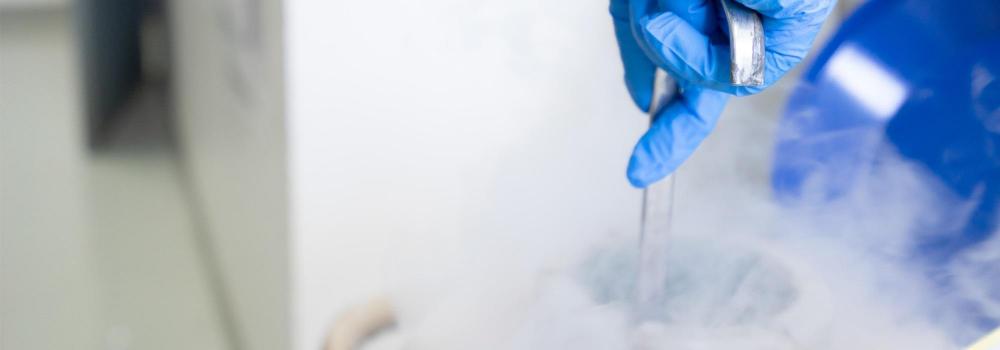How can vaccines be stored safely without losing potency? This is an important question hospital administrators face. Wavering temperatures and inappropriate storage of vaccines can damage them and make administering them to patients ineffective.
Cryogenic vaccine storage is important; however, this requires a high level of monitoring to ensure that it meets safety and compliance measures put forth by the Centers of Disease Control and Prevention (CDC). This article will explain the ways you can effectively monitor your cryogenic storage and discuss Primex OneVue Monitoring and temperature monitoring solutions that can help hospitals stay in compliance.
Effective Vaccine Storage
Failure to follow CDC best practice guidelines for vaccine storage can not only result in ineffective vaccinations, but it could also cause your facility to incur significant costs. Inadequate refrigeration temperatures and poor storage conditions can impact the effectiveness of vaccines and cause waste. According to reports earlier this month, some COVID-19 vaccines will require subzero storage and shipping temperatures, some as low as -94 °F (-70 °C). If proven true, this could create issues for pharmacies and hospitals not accustomed to frozen or cryogenic conditions or for those without the proper resources.
Minute changes during storage, including something as simple as the orientation of packaging, could affect the success of cryogenically transporting vaccines. While Primex OneVue Sensors can be used to track temperature control, monitor access, and store information to create compliance reports, how can hospital administrators ensure safe cryogenic vaccine storage and also stay in compliance?
State-of-the-art technology and consistent monitoring of transportation and storage will ensure vaccine effectiveness withstands changing climates and environments.
Cryogenic Storage Options and Protection
To preserve and store biologics long-term, healthcare facilities use liquid nitrogen dewar systems to help keep the stable, low-temperature environment necessary for stem cells. With talk of COVID-19 vaccines in the works, the dewar system may be a popular option for cryogenic transportation and conservation of vaccines.
The dewar system is an unpressurized vessel designed to withstand extreme temperatures. As hospitals begin utilizing systems such as these to transport and store vaccines, what is the best way to comply?
Here are some steps to help protect your liquid nitrogen dewar and vaccines:
Use a Reliable Temperature Monitoring System
To avoid biochemical reactions that may cause damage to vaccines or cells, it is imperative that sensitive vaccines and biologics maintain a very low temperature. Protect your inventory with temperature monitoring systems that alleviate the need for manual temperature monitoring and data logging. The Primex OneVue suite meets today’s stringent IT security policies and seamlessly captures and documents vital monitoring data for pharmacies and hospitals. Compliant with CDC and The Joint Commission guidelines, this easy-to-install temperature monitoring solution is available in single- and dual-prove variations (refrigerator and freezer models, respectively). When conditions move out of a specified range, audible and visual alarms are automatically triggered, along with email, text, and phone alerts to ensure you are aware of any temperature fluctuations.
Keep the Unit Clean and Dry
In addition to ensuring the dewar system itself is operation correctly, the environment around the dewar system should be carefully monitored and maintained to ensure the unit is able to store sensitive assets as effectively as possible. This can include monitoring differential pressure within the storage room and water leaks — changes in pressure may indicate a potentially dangerous failure in the pressure-release valves of the tank, which can often be caused by water leaks.
Sensors can be installed throughout a hospital or healthcare facility to monitor temperature, humidity, water leaks, and access of buildings and controlled rooms. The automation allows key staff to be alerted when something goes awry, whether a change to conditions in a pressurized room or a jump in temperature or humidity of a storage area.
Mitigating Cryogenic Storage Challenges With Primex OneVue
The move toward cryogenic storage for vaccines may pose many challenges to healthcare facilities. But with the help of Primex OneVue, proper temperature control and maintaining vaccine protocol compliance is made easy through precision monitoring and thorough documentation. With the environmental monitoring solutions and proactive alerts within the Primex OneVue suite, hospital staff can have peace of mind knowing that their vaccine supply is stored safely.
References:
https://www.biopharma-reporter.com/Article/2016/11/23/Cold-chain-challenges-evolving-with-industry-Cryoport
https://www.phchd.com/us/biomedical/vaccine-storage
https://pharmaceuticalcommerce.com/clinical-operations/covid-19-vaccines-chilled-frozen-or-cryogenic/
